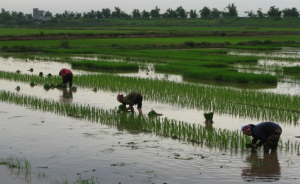Financial Times | 13 June 2010
By Abeer Allam in Riyadh
As Saudi Arabian investors accelerate efforts to farm land overseas, a group of leading businessmen said on Saturday that they were launching an agricultural company to grow rice under contract with growers in Asia.
The Far East Agricultural Investment Co, an SR100m ($26.6m) investment vehicle, has already arranged leases in Cambodia, Vietnam, Pakistan and the Philippines for aromatic and long grain basmati rice, both intended to export to Saudi Arabia at market prices, said Mohammed Abdulla al-Rajhi, chairman of the new company. The first harvest of rice, about 60,000 tons, is due to arrive to Saudi Arabia early next year, he said.
“We will start with rice, but we will expand to cover all other strategic foods the kingdom needs,” Mr Rajhi told Financial Times. Mr Rajhi, who also heads the Tabuk Agricultural Development Company, said that the new company would grow tropical fruits and contract land suitable for wheat and corn in central Asia.
According to the agreements already signed, the Saudi partners will provide the seed, engineering and harvesting technology, build mills, silos and warehouses, and invest in roads and other logistics, he said.
Saudi Arabia, China and other desert Gulf states covet underdeveloped farmland in African and Asian nations to ensure access to food, but their interest has drawn criticism. Jacques Diouf, director-general of the UN Food and Agriculture Organisation has warned of the perception of “neo-colonialism”, particularly if countries afflicted by hunger ship their food staples to the Gulf.
Two years ago, Saudi Arabia announced plans to phase out domestic wheat production by 2016 from the current 2.5m tons to protect scarce fossil water resources. But global commodity prices skyrocketed and rice-producing countries announced restrictions on exports, inflating food prices.
Concerned about food security and flush with oil money, Saudi Arabia announced the King Abdullah Initiative for Agricultural Investment Overseas to secure imports of strategic foods, including wheat, soybeans, sugar, rice and alfalfa, from Saudi-managed farms abroad.
The plan was for private companies to lead investments with the government providing political support and credit facilities through a SR3bn ($800m) agriculture company owned by the Public Investment Fund.
But when global commodity prices plummeted in late 2008 and 2009, Saudi businessmen complain that government enthusiasm ebbed.
Other Saudi companies have already started agricultural arrangements in countries such as Egypt, Sudan, Ethiopia and Kazakhstan. Jannat, another company chaired by Mr Rajhi, is securing 100,000 to 215,000 hectares of land abroad, including investing $100m in African countries.
Wary of the image and the potential of stirring political instability or anger, Mr Rajhi indicated on Saturday that the farms have no plans for buying land or monopolising harvests.
“Once they see Saudis or Gulf countries, they think of agricultural exploitation,” he said. “We do not want to take any country’s land and we are aware we have to give something back to the community. We will create jobs, build roads and schools and infrastructure.”
The company intends to launch an IPO after completing three budget years, he said.











